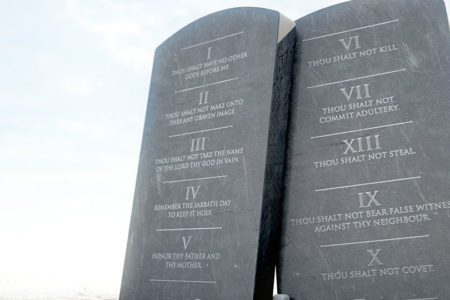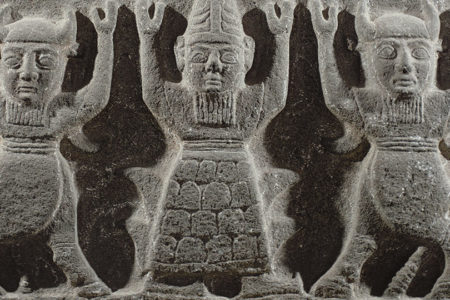Just Like Jezebel Part One
Mike Wallace of 60 Minutes fame has never been my favorite television reporter. He always seems a little too arrogant—too sure of himself. But after the Pentagon and World Trade Center tragedies of 9/11, I saw him dumbfounded.
He had gone to Egypt with his CBS crew to interview a group of Muslims. An extremely brave venture for a Jewish reporter, I thought. The men were sitting in what looked like a giant tent, watching television. And what they told Wallace dumbfounded me as well.
Despite the profusion of irrefutable evidence that the September 11, 2001, terrorists were Muslims, these Egyptians blamed the Jewish people. Even though Osama bin Laden, a Saudi Muslim, took credit for 9/11, these men still blamed the Jewish people.
I sat with my mouth open in utter disbelief. So did Mike Wallace.
This September marks the fourth anniversary of that awful day when radical Islam officially declared war on the United States by commandeering four commercial airliners and slamming three of them into prominent American buildings, killing more than 3,000 people. The fourth plane was derailed from its mission by several brave, patriotic men who went to their deaths by crashing it in a field in Pennsylvania.
Yet these Muslims, shaking their heads up and down as though they were more certain of their facts than the names of their own mothers, insisted to Mike Wallace that the individuals responsible for 9/11 were Jewish.
How do people become so abysmally deceived? How can they see irrefutable facts that point incontrovertibly in a single direction and then, contrary to all logic, turn in the opposite direction to deliberately believe a lie? Yet people do so every day, just as they have for centuries.
Jezebel is a classic example. She was a Phoenician (Sidonian) princess who witnessed obvious truth, yet blatantly rejected it because she preferred a lie. All the qualities God despises she personified: “A proud look, a lying tongue, hands that shed innocent blood, a heart that devises wicked plans, feet that are swift in running to evil, a false witness who speaks lies” (Prov. 6:17–19). She was so heartless and cruel that her very name has become synonymous with evil.
Jezebel gained power in Israel through her marriage to Ahab, who reigned over the northern tribes of the divided kingdom from 874 to 853 B.C. Although an able warrior, Ahab was a weak-minded, petulant, deceitful idol worshiper who ensconced the vile Canaanite deity Baal in a lavish temple he built for him in the capital city of Samaria. He saturated the land with idolatry and allowed his domineering wife to slay the prophets of Jehovah and nearly exterminate worship of the true and living God.
Scripture first mentions Jezebel in 1 Kings 16:31:
And it came to pass, as though it had been a trivial thing for him [Ahab] to walk in the sins of Jeroboam the son of Nebat, that he took as wife Jezebel the daughter of Ethbaal, king of the Sidonians; and he went and served Baal and worshiped him.
Thus Ahab was despicable, but his wife made him even worse: “There was no one like Ahab who sold himself to do wickedness in the sight of the Lᴏʀᴅ, because Jezebel his wife stirred him up” (21:25).
Murder came naturally to Jezebel. Her father, a priest of the Canaanite deity Astarte (also called Venus and the queen of heaven), usurped the Sidonian throne after murdering his brother, King Pheles.1 Unlike Jehovah, the Canaanite gods of stone and wood did not call their worshipers to a high moral standard. There were no Ten Commandments containing such injunctions as, “Thou shalt not murder.” In fact, wrote expert Marvin H. Pope, worship generally involved “horrendous and repulsive” acts that involved “sexual excesses and perversions (Isa. 57:3–10).”2
That fact isn’t surprising because Canaan’s firstborn son, Sidon, founded the city that bore his name. It was the oldest of the Phoenician cities located at the northernmost tip of the territory that Joshua had apportioned to the tribe of Asher (Josh. 19:28). As Canaanites, the Sidonians pursued the detestable practices that God had intended the Israelites to destroy. Instead, Israel embraced Canaanite worship, “while Jezebel massacred the prophets of the Lᴏʀᴅ” (1 Ki. 18:4).
Symbolized by the bull, Baal was considered the fertility god and giver of the life-sustaining rains. His followers often exalted him using terminology reserved for the Almighty, such as “Lord of the earth,” “Lord of heaven,” and “rider on the clouds.” Wrote Pope,
Anxiety about the rainfall would be a continuing concern of the inhabitants which would suffice to give rise to rites to ensure the coming of the rains. Thus the basis of the Baal cult was the utter dependence of life on the rains which were regarded as Baal’s bounty.3
Since water was so vital, Jehovah (ʏʜᴠʜ) decided to show Israel who controlled the rain.
And Elijah the Tishbite, of the inhabitants of Gilead, said to Ahab, “As the Lᴏʀᴅ God of Israel lives, before whom I stand, there shall not be dew nor rain these years, except at my word” (17:1).
For three years and six months, not a drop of rain fell from heaven (Lk. 4:25). Ironically, during this drought God sent the prophet Elijah to, of all places, Zarephath of Sidon. While Jezebel the Sidonian richly fed 850 false prophets in her sumptuous palace (1 Ki. 18:19), a poor Sidonian widow fed Elijah. And to her Jehovah extended His tender mercy and grace by multiplying her oil and flour and raising her son from the dead (1 Ki. 17:14–23). Truly, “God resists the proud, but gives grace to the humble” (Jas. 4:6).
As the drought worsened, famine increased and the fields withered. Water became so scarce that Ahab contemplated killing some of his cattle (1 Ki. 18:5). By then even Jezebel must have recognized the obvious: The prophet of Jehovah said it would not rain; it did not rain; and Baal could not make it rain. The facts were evident. But like the Muslims whom Mike Wallace interviewed, Jezebel was not interested in facts. She believed what she decided to believe—and nothing would dissuade her, not even the spectacular contest that would ensue.
ENDNOTES
- C. F. Keil and F. Delitzsch, The First Book of Kings in Commentary on the Old Testament in Ten Volumes, vol. 3 (Grand Rapids: Eerdmans, n.d.), 228.
- Marvin H. Pope, “Baal Worship,” Encyclopedia Judaica, Cd-ROM edition, 1997.
- Ibid.







